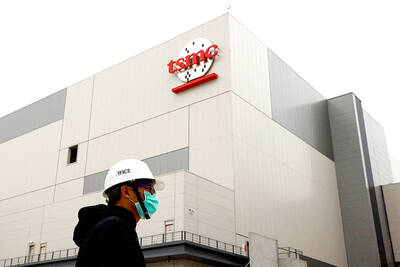Swedish regulators yesterday banned the use of telecom equipment from China’s Huawei Technologies Co (華為) and ZTE Corp (中興) in the country’s 5G network ahead of the spectrum auction scheduled for next month.
The Swedish Post and Telecom Authority (PTS) said the setting of the license conditions followed assessments by the Swedish Armed Forces and security service.
European governments have been reviewing the role of Chinese companies in building their networks following pressure from the US, which has said they pose a security threat because, among other concerns, Chinese companies and citizens must by law aid the state in intelligence gathering.

Photo: Reuters
Sweden’s security service called China “one of the biggest threats against Sweden.”
The UK in July ordered Huawei equipment to be purged completely from its 5G network by 2027, becoming one of the first European countries to do so.
Huawei and ZTE did not immediately respond to requests for comment on the decision by Sweden, home to Ericsson AB, one of Europe’s leading telecoms equipment suppliers.
“The ban leaves network operators with less options and risks slowing the rollout of 5G in markets where competition is reduced,” CCS Insight chief of research Ben Wood said.
The ban is likely to benefit rival telecom equipment makers Ericsson and Finland’s Nokia Oyj.
The PTS said companies taking part in the auction must remove Huawei and ZTE gear from existing central functions by Jan. 1, 2025.
The regulator defined central functions as equipment used to build the radio access network, the transmission network, the core network and the service and maintenance of the network.
The PTS said the license conditions were decided to address the assessments made by the armed forces and security service.
It has approved the participation of Hi3G Access AB, Net4Mobility, Telia Sverige and Teracom Group in the planned spectrum auction of 3.5 gigahertz and 2.3 gigahertz, key bands crucial for the rollout of 5G.
Tele2 AB and Telenor are to participate together as Net4Mobility to secure spectrum for a joint nationwide 5G network.
Tele2, which uses Huawei equipment in its network and had earlier called Huawei an important vendor, said that the PTS’ decision “does not change our plans substantially.”
“We may have to phase different costs differently between years to meet security conditions on time,” a spokesman told reporters.
The 5G spectrum auction was originally planned for early this year, but the PTS last year said it would delay the auction due to a security review.

Stephen Garrett, a 27-year-old graduate student, always thought he would study in China, but first the country’s restrictive COVID-19 policies made it nearly impossible and now he has other concerns. The cost is one deterrent, but Garrett is more worried about restrictions on academic freedom and the personal risk of being stranded in China. He is not alone. Only about 700 American students are studying at Chinese universities, down from a peak of nearly 25,000 a decade ago, while there are nearly 300,000 Chinese students at US schools. Some young Americans are discouraged from investing their time in China by what they see

Taiwan Semiconductor Manufacturing Co (TSMC, 台積電), the world’s largest contract chipmaker, yesterday reported record sales for the first quarter, which analysts attributed to solid demand for emerging technologies. Consolidated revenue totaled NT$592.64 billion (US$18.51 billion) in the January-to-March period, up 16.5 percent from a year earlier, but down 5.26 percent from the previous quarter, TSMC said in a statement. The first-quarter revenue beat analysts’ average projection of NT$579.5 billion, Bloomberg News reported. That performance lends weight to expectations that the world’s most valuable chipmaker would return to solid growth this year after weathering a post-COVID-19-pandemic cratering of smartphone and computer sales. TSMC is budgeting

MAJOR DROP: CEO Tim Cook, who is visiting Hanoi, pledged the firm was committed to Vietnam after its smartphone shipments declined 9.6% annually in the first quarter Apple Inc yesterday said it would increase spending on suppliers in Vietnam, a key production hub, as CEO Tim Cook arrived in the country for a two-day visit. The iPhone maker announced the news in a statement on its Web site, but gave no details of how much it would spend or where the money would go. Cook is expected to meet programmers, content creators and students during his visit, online newspaper VnExpress reported. The visit comes as US President Joe Biden’s administration seeks to ramp up Vietnam’s role in the global tech supply chain to reduce the US’ dependence on China. Images on

US CONSCULTANT: The US Department of Commerce’s Ursula Burns is a rarely seen US government consultant to be put forward to sit on the board, nominated as an independent director Taiwan Semiconductor Manufacturing Co (TSMC, 台積電), the world’s largest contract chipmaker, yesterday nominated 10 candidates for its new board of directors, including Ursula Burns from the US Department of Commerce. It is rare that TSMC has nominated a US government consultant to sit on its board. Burns was nominated as one of seven independent directors. She is vice chair of the department’s Advisory Council on Supply Chain Competitiveness. Burns is to stand for election at TSMC’s annual shareholders’ meeting on June 4 along with the rest of the candidates. TSMC chairman Mark Liu (劉德音) was not on the list after in December last